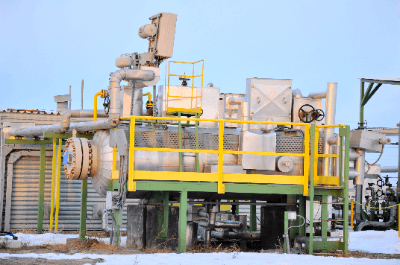What Is an Oil-Water Separator?

An Oil-Water Separator is a device designed to separate oil from a liquid mixture of oil and water. It is commonly used to extract oil from factory wastewater or to recover valuable liquids that cannot be easily disposed of. The main types of Oil-Water Separators are emulsion separation and oil-water separation, where emulsion refers to a state where oil and water are thoroughly mixed.
These separators play a vital role in various industries, offering several types of separation based on the oil’s condition, the removal target, and the desired purity level, thus reducing environmental impact and operational costs.
Uses of Oil-Water Separators
Oil-water separators are extensively utilized in situations where oil might mix with coolants, refrigerants, and cleaning fluids. Their applications include:
- Removal of foreign matter/moisture from vacuum oil pumps
- Oil separation in plating/surface treatment wash reservoirs: plating
- Groundwater and soil treatments
- Cleaning solutions in various industries
- Coolants in cutting/polishing processes
- Compressed air drain wastewater
- Die casting wastewater management
- Rolling coolant wastewater treatment
- Ink and pigment wastewater in printing plants
- Cooling water management in forging processes
- Power plant cooling water systems
- Car wash drainage water
- Food factory wastewater
- Paint booth wastewater management
By efficiently separating water and oil, these systems help reduce treatment costs and environmental impact, extending the life of cleaning fluids and lubricating oils.
Principle of Oil-Water Separators
Oil-Water Separators employ various methods for separation, with some of the most common being:
1. Permeation Separation Method
This method filters oil-containing water through a porous filtration yarn assembly or membrane under pressure, extracting pure water while removing oil and solids.
2. Specific Gravity Separation Method
Utilizing the difference in specific gravity between oil and water, this method separates oil that surfaces or is stored in tanks. It can be time-consuming if the specific gravity difference is minimal.
3. Chemical Separation
Chemical separation degreases and removes oil, employing water-soluble agents like electrolyzed ionized water for a low environmental impact. This method is also effective for emulsion oil. Pre-separation of floating oil using a belt-type oil skimmer is crucial for large volumes of oil.
4. Centrifugal Separation Type
This method uses centrifugal force to separate oil from water by rotating the mixture at high speed. It effectively removes emulsified oil and is also useful for water-soluble cutting oil, coolants, and water-based detergents.
Other methods include ultrasonic, electrical, air jet, biological, vacuum suction separation, and more.
Features of Oil-Water Separators
The permeation method Oil-Water Separator efficiently treats oil emulsions without chemicals and produces minimal sludge. It can significantly reduce waste liquid volume and thus industrial waste costs. The permeate is also recoverable for reuse, offering both environmental and economic benefits.
Gravity-based methods are simple and widely used. Centrifugal types are effective even for emulsified oils and solids.
Other Information on Oil-Water Separators
Regulations for Oil-Water Separators
There are several regulations about waste oil disposal and oil leakage accidents:
- Waste Disposal Law: Mandates proper disposal of waste oil by recyclers, with penalties for illegal actions.
- Water Pollution Control Law: Requires businesses to manage effluent properly, penalizing improper disposal or accidental leaks.
- Fire Service Law: Requires measures for controlling damage in oil leakage accidents, with penalties for non-compliance.
- River Law: Obligates businesses to recover and bear costs for accidental oil spills into rivers.
- Occupational Health and Safety Law: Mandates businesses to inform workers of potential health risks from oil use, with penalties for inappropriate response.
- Law on Waste Disposal and Cleaning: Stipulates proper industrial waste management, including waste oil, with penalties for non-compliance.